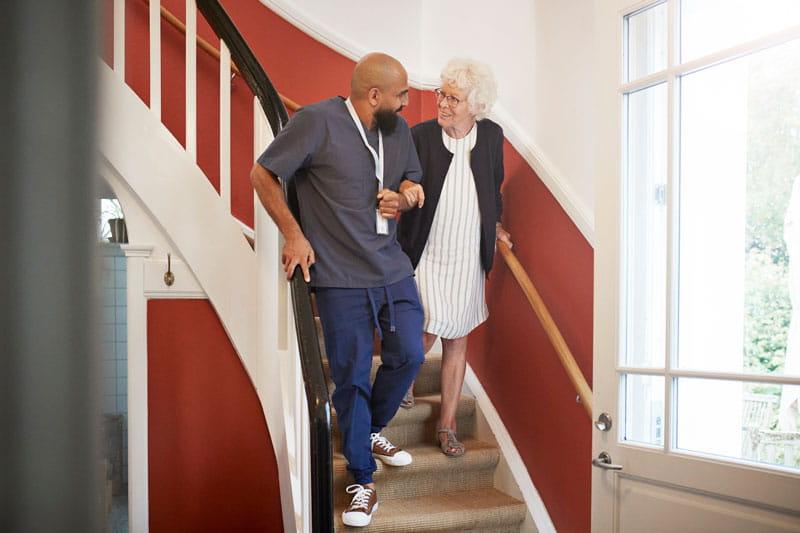预防和管理跌倒 in 成人 Cardiovascular Disease

Falls are a leading cause of injury in older Americans 和 carry the risk of permanent disability, high medical costs 和 even premature death.
但是对于那些 心血管病, the risk of falls is even higher, with 60% at moderate or high risk for falls. 药物治疗,越来越虚弱, 心律失常, 低血压 昏厥只是其中的一些原因.
消除耻辱
Even when falls are not associated with significant injury, they can result in increased fear of falling 和 lead to functional decline in seniors, 导致生活质量下降. But despite the frequency of falls among people with 心血管病, the topic is often overshadowed by other medical issues.Many older adults who fall may also be hesitant to mention falls to health care professionals or others in their life, thinking they will lose independence in their day-to-day activities 和 be treated differently.
药物增加风险
Certain medications for cardiovascular conditions like high blood pressure can contribute to falls. The same is true for prescription drugs for non-heart related conditions. Medications that have been shown to increase risk of falls include:
- 心律失常药物
- 抗抑郁药
- 抗精神病药物
- Anti-anxiety medications (benzodiazepines) such as lorazepam 和 nonbenzodiazepine, 镇静催眠药,如唑吡坦
- 糖尿病药物
- 利尿剂
- High blood pressure medications including beta-blockers, ACE inhibitors 和 angiotensin receptor blockers (ARBs)
- 阿片类药物
- Non-steroidal anti-inflammatory drugs (NSAIDs)
- Selective serotonin reuptake inhibitors (SSRIs)
It’s important to discuss the side effects of all medications you are taking with a health care professional 和 weigh the increased risks of falling with their benefits. It’s often possible to choose medications with fewer side effects or that can be taken in lower doses. 在某些情况下, 替代, non-pharmacological options may be available 和 should also be discussed with your doctor or pharmacist.
心血管疾病
晕厥(晕倒): When there is decreased blood flow to the brain, you can lose consciousness 和 fall. 的风险 晕倒 increases with age 和 can result in falls.
除了, people with cardiovascular conditions are more likely to suffer from 低血压, medically known as orthostatic hypotension. When blood pressure drops suddenly, a person may experience dizziness 和 faint. The likelihood of sudden 低血压 increases with age 和 for those with hypertension.
心力衰竭和心律失常: 成人 心脏衰竭 和 心律失常 (irregular heartbeat) have an especially high risk of falls because their heart may not pump as efficiently, 或者可能以不规则的节奏跳动, causing a decrease in blood flow to the brain. They are also more likely to take multiple prescriptions, which may increase dizziness 和 lead to 晕倒 和 falls. People with 心脏衰竭 are 13% more likely to fall than those with other chronic diseases.
Someone with 心脏衰竭 faces a fourfold risk of sustaining a fracture that requires hospitalization compared with patients with other forms of 心血管病.
心房纤颤: Patients with irregular, rapid heartbeat, clinically known as 心房纤颤 或心房纤颤,也面临更高的跌倒风险. If you have 心房纤颤 和 need anticoagulation therapy, 全面评估中风风险, 出血和跌倒是很危险的.
其他/ Non-cardiovascular问题:
Non-cardiovascular conditions like arthritis, 神经问题, 耳聋, blindness 和 cognitive impairment such as dementia can all significantly affect mobility 和 balance, 和 in turn increase the likelihood of falling. But you can do many things to reduce the risk of falling, such as:
- Addressing hazards at home such as loose rugs, mats, clutter 和 stairs.
- Ensure adequate lighting 和 ambient temperature at home.
- 穿舒适的鞋子.
- Incorporate physical 和 occupational therapy into wellness plans.
- 审查药物.
It’s also crucial to stay closely connected to your health care professional 和 your support network of family 和 friends to help address 和 prevent falls.





